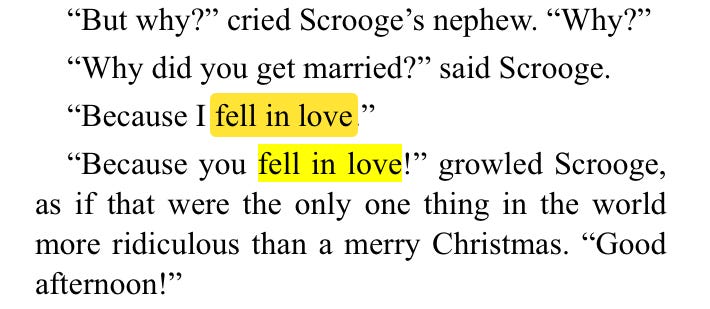Satan, Scrooge, Slippers: the magic of associative thinking in English
How do we get students to think independently about meaning?
I get cold feet, so I wear slippers. I have quite a nice pair, but, true to their name, they slip off, often when I least expect or want it. It often happens, for example, when I’m going up the stars: the slippers will slip and I will stumble and trip. And I will fall: not a lot — just a little.
Falling and slippers got me thinking. The word ‘fall’ can take us to many places, and we don’t need to go up any stairs to get there. Let’s just consider some of the ways we can (and do) use fall:
I fall over.
Rain falls heavily.
Pride comes before the fall.
Romeo falls in love with Juliet.
Lucifer’s fall from grace.
I’m falling apart.
Trust fall
Scrooge mocks Fred with a sarcastic ‘Because you fell in love!’
Things fall apart; the centre cannot hold; mere anarchy is loosed upon the world …
Fall, gall themselves, and gash gold-vermillion.
We quite quickly find ourselves dealing with concepts1, in this case the concept of fall. Even though the usages above seem diffuse, they have an awful lot in common. Analogous with fall are concepts of:
Injury
Failure
Downward motion
Unexpected occurances
Punishment
Bad luck
Fragility
Anger
Helplessness
Lack of agency
When we think like this, we’re opening ourselves up to the true nature of how our language works. Our language is a tool; first we make our tools; thereafter our tools shape us.2 So, if we interrogate uses of language in this way, we can get ourselves to some interesting places.
This has really useful application in the English classroom. I’m looking at the Power and Conflict poetry cluster for AQA Literature with Y11, and poetry can be pretty damn impenetrable for anyone, let alone students. Because of this, it’s really easy for poetry lessons to become unidirectional — teacher discusses the poem from the front, and students internalise the teacher’s response as their own. Except it is not, and can never be, their own; that’s not how poetry works. If I’m right in thinking that we think with our whole selves (more on this in a future post), then what students end up recording is a sad simulation of someone else’s cognition, the outward flicks and kicks of a ballet they don’t understand. They’ll slide down the surface of things. 3 What’s needed is an approach that allows students into literature (and note how I’m using into as concept here; there’s nothing special — we all do it — but note it, nonetheless) at a low floor. To quote Bleiman — we’ve got to meet students ‘where they’re at.’4
Drawing attention to analogies and concepts is a great way in. When Fred and Scrooge say the phrase ‘fell in love’ (if you’ll permit me to sashay away from poetry and back to the original concept of this post), the concept of fall is presented differently by either speaker, even though they’re using the same words:
Fred doesn’t say he’s in love. Instead, he alludes (consciously or unconsciously, it doesn’t really matter) to the helplessness of falling in love. To such an optimistic and romantic character, this helplessness is what gives love its joy: he didn’t choose whether or not he fell in love, but when it happened to him (because this is how falls work: they happen to us; we don’t make them happen intentionally5) he embraced it and let it happen. A trust fall. Part of the joy of love is the thrill of that unknown, letting oneself be helpless.
But this is why, when Scrooge spits the same phrase back at Fred, changing only the pronoun, that very helplessness — and Fred’s willingness to experience the same — is anathema to Scrooge. Scrooge, who wants to hoard, and secure, and save, and safeguard, cannot conceive anything worse than helplessness. For Scrooge, falling — even if it is in love — is analogous with failure. Elsewhere in the novella, his falling in love with Belle becomes a fall from grace. Our concepts become our gods: we cannot help but worship them. Once Scrooge has associated falling — and falling in love — with fear and failure, it’ll take a miracle to change his mind. Fortunately, Dickens has a plan in that regard.
This is why things need to be generative. Different people do different things with concepts and analogies. It’s a bit like how for some people love the idea of bungee jumping (another type of fall) whereas sensible people (like me) can’t imagine anything worse. Same thing, different responses.
Let’s approach poetry like this. We’ve been looking at Heaney’s ‘Storm on the Island’. I extracted one word from it:
SQUAT
I asked students what word Heaney could have used instead. I was given ‘small’. I then asked them to think about all the words we’d associate with ‘small’ and all the words we’d associate with ‘squat’, making two lists:
Small
Baby
Helpless
Vulnerable
Easily missed
Pointless
Not important
Squat
Low
Crouch
Tough
Immovable
Chunky
Solid
Thick
Dense
Squashed down
I pointed out that, despite their apparent similarities, they were two very different words once we’d started to abstract them. Heaney could have written ‘small’, but he didn’t. He didn’t want those analogies. Or, at least, that’s not what he ended up with (his intentions don’t really matter, what’s in the poem does). By writing squat, Heaney starts his poem with an image of tough togetherness (thanks to its coupling with we), the hardy spirit of the Aran Islands. But, we do also associate smallness with squat, too, which does undermine the toughness of the word. Squat is strong, but self-effacingly so. They didn’t build their houses tough, or thick. There is confidence, but not totally, which makes sense when we look at the last line:
Strange, it is a huge nothing that we fear.
One word. But thinking about it like this yields multitudes. And the entry point is really low, because all students are doing is making themselves of something they do anyway, which is conceptualise and analogise. They take words and think about the different concepts chunked within those words. They can do this with anything they read. And as they get used to doing it — to slowing down and really seeing what language is doing — they’ll generate their own insights, with their whole selves.
This piece and the ideas in it has been inspired by Surfaces and Essences, by Hofstadter and Sander.
By the way, just notice all the different analogies and concepts I’ve just used, and think of all the places they could take you.
Bleiman, B, What Matters in English Teaching, 2020.
Though there are, naturally, exceptions: not many would wish to make themselves a fall guy, for example.




